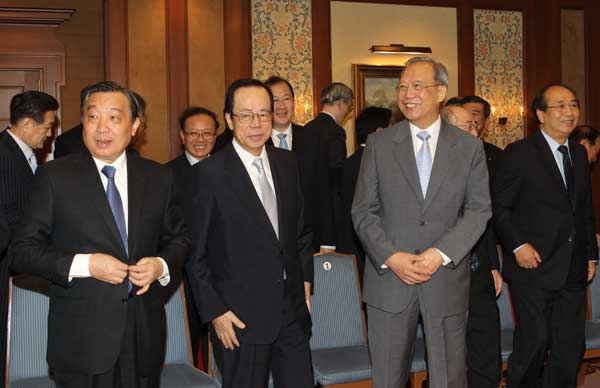Stronger ties offer greater protection
Updated: 2012-07-02 20:45
By Ding Qingfen in Tokyo (China Daily)
|
||||||||
|
 Attending the opening ceremony of the Eighth Beijing-Tokyo Forum on Monday in Tokyo are, from left, State Council Information Office Minister Wang Chen, former Japanese prime minister Yasuo Fukuda, former vice-premier Zeng Peiyan and Zhao Qizheng, head of the foreign aff airs committee of the National Committee of the Chinese People's Political Consultative Conference. [Zou Hong / China Daily] |
The top two Asian economies — China and Japan — are creating opportunities to strengthen relations to safeguard themselves against global economic turbulence, former vice-premier Zeng Peiyan said.
Both countries should also fast-track negotiations on the China-Japan-South Korea free-trade pact, cooperate further in the new energy sector and promote small and medium-sized enterprises, Zeng said during the opening ceremony of the Eighth Beijing-Tokyo Forum.
The forum, being held in the Japanese capital and co-sponsored by China Daily and Genron NPO, a Japanese think tank, has been held alternately in Beijing and Tokyo since 2005.
China and Japan are marking the 40th anniversary of the normalization of diplomatic relations.
"Against the severe backdrop of the global economy, and the debt crisis, no single country or region can deal with all the challenges on its own," Zeng said.
The dynamism of Asian markets has helped drive the global economy, he said.
As the leading economies in Asia, "China and Japan exert a significant impact on the regional and global economy," Zeng said.
They "shoulder important responsibility'' and should work together to promote stronger ties and make a greater contribution to global stability, he said.
Wang Chen, minister of the State Council Information Office, agreed.
"As two of the major global economies, China and Japan should boost cooperation to tackle the global economic crisis and infuse new vigor into the Asian and world economy," Wang said at the forum.
China-Japan trade volume in 2011 hit a record $340 billion, 330 times greater than four decades ago.
China is Japan's largest trade partner and the second-largest destination for Japanese exports. Japan is the fourth-largest trade partner for China and the third-largest source of foreign investment.
"Mutual trust and benefit have persistently been the two fundamental factors of China-Japan relations," Zeng said.
"China and Japan face new opportunities in economic cooperation and the two nations share common interests in growth strategies," Zeng said.
China is transforming its growth model and Japan is committed to reconstruction.
As a major part of its 12th Five-Year Plan (2011-15), China will focus on boosting domestic consumption.
New energy, innovation and the green economy will also play a greater role.
The Japanese government plans to spend 20 trillion yen ($252 billion) to rebuild areas devastated by last year's earthquake.
"We can expand cooperation in energy management, the green economy, manufacturing and strategic emerging industries," Zeng said.
Wang highlighted the fact that the two economies are highly complementary.
This means there is huge potential for the two countries to tap into "environment protection, low-carbon, agricultural development, forestry, the protection of wild animals and food and medicine safety".
From January to April, Japanese investment into China surged by 16 percent from a year earlier, to $2.7 billion, but the flow from the EU to China dropped by 28 percent, year-on-year, during the same period.
"It is a fantastic time for China and Japan to develop investment and trade relations, and we have reason to believe that a new wave of investment flowing into China by Japanese companies is coming," said Wei Jianguo, former vice-minister of commerce.
Wei said China's efforts to expand domestic consumption will provide immense opportunities for Japanese investors and companies.
"If more Japanese companies come to invest in China and target the consumption market, Japanese investment in China could grow by more than 70 percent," Wei said.
In May, the governments of China, Japan and South Korea agreed to launch negotiations for a three-way trade pact this year.
"China should push the negotiation process forward," Zeng said.
China-Japan relations were strained in 2010 after a Chinese trawler collided with patrol boats from the Japanese Coast Guard in waters near China's Diaoyu Islands.
In June, Japan joined the United States and the European Union in requiring the World Trade Organization to form a dispute settlement board to investigate China's exports of rare earths. These are materials that are widely used to make high-tech goods.
"History has shown that if we cooperate with each other, we both enjoy benefits," Zeng said.

 Relief reaches isolated village
Relief reaches isolated village
 Rainfall poses new threats to quake-hit region
Rainfall poses new threats to quake-hit region
 Funerals begin for Boston bombing victims
Funerals begin for Boston bombing victims
 Quake takeaway from China's Air Force
Quake takeaway from China's Air Force
 Obama celebrates young inventors at science fair
Obama celebrates young inventors at science fair
 Earth Day marked around the world
Earth Day marked around the world
 Volunteer team helping students find sense of normalcy
Volunteer team helping students find sense of normalcy
 Ethnic groups quick to join rescue efforts
Ethnic groups quick to join rescue efforts
Most Viewed
Editor's Picks

|

|

|

|

|

|
Today's Top News
Health new priority for quake zone
Xi meets US top military officer
Japan's boats driven out of Diaoyu
China mulls online shopping legislation
Bird flu death toll rises to 22
Putin appoints new ambassador to China
Japanese ships blocked from Diaoyu Islands
Inspired by Guan, more Chinese pick up golf
US Weekly

|

|






